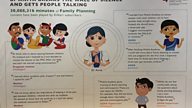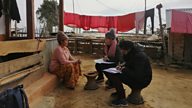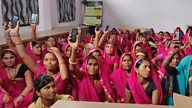Tagged with: Leaving no one behind
Posts (8)
-
Seven lessons from scaling up mHealth in India
Sara Chamberlain, Radharani Mitra, Anna Godfrey
±«Óãtv Media Action
-
Out from the shadows: Tackling the stigma of disability in refugee communities
Fariha Rahman
Bangladesh research officer, ±«Óãtv Media Action
-
Designing for inclusion: From invisible to #Invaluables
Varinder Kaur Gambhir, Soma Katiyar and Ragini Pasricha
±«Óãtv Media Action India
-
Using compassion to build tolerance through radio drama in Myanmar
Becky Palmstrom
Senior advisor, governance and rights
-
Why women in journalism need to be considered in pandemic and conflict recovery
Julie Boutros
Project manager, Eastern Europe
With public interest media under threat around the world, we are committed to continuing our efforts to ensure that women’s voices are meaningfully represented - throughout media organisations, and in the content they produce – to properly reflect the audiences they serve.
-
Online violence against women and girls in Nepal: what we have learned
Anju Bhatt and Manju Gautam
Research manager and research officer, Nepal
-
How can digital technology empower women without worsening inequality?
Sara Chamberlain
Digital project director, ±«Óãtv Media Action India
-
Examining awareness of disability in Nigeria
Manju Gautam and Akunna Penny
Research officer & research manager, ±«Óãtv Media Action
An estimated 15% of the global population live with some form of disability - including invisible impairments such as anxiety or chronic illnesses. But the lack of data around people with invisible disability makes it hard to foster understanding and overcome barriers.













